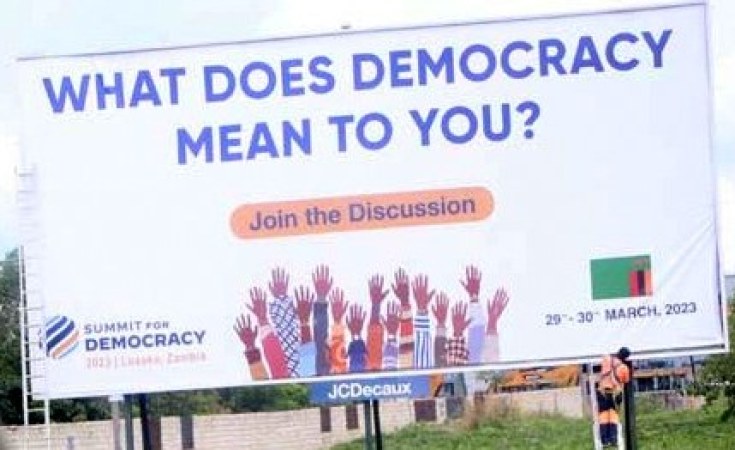Today, the global community is convening for the second annual Summit for Democracy. Led by Costa Rica, the Republic of Korea, the Netherlands, the United States, and the Republic of Zambia, the gathering invites representatives from government, business, and civil society to share strategies for championing resilient and robust democracies—rooted in transparency, human rights, and collective dignity.
As the president of a host country and the leader of a foundation committed to human rights and ending inequality across the globe, we share an abiding commitment to the power of democracy—and a sense of urgency around the transformations necessary to make a brighter, more democratic future a reality.
We are approaching an international inflection point. According to nonprofit watchdog V-Democracy, democracy is now in its 27th year of global decline, as corruption and crackdowns on political dissent aid the rise of dictatorships. All the while, global conflict and inequality increase instability between countries and within them; there were more coups last year than in any year of the last decade.
As we see around the globe, no region is immune to the threat of undemocratic rule. And in Africa, a landmark report by the Mo Ibrahim Foundation recently pronounced the continent "less democratic and less safe" than it was a decade ago. Pandemic restrictions created cover for anti-democratic practices including postponing elections and rolling back hard-won civil rights and liberties. The result: a rise in violent suppression of dissent and unjust consolidation of power that threatens the rights and futures of the more than one billion people living in Africa.
If governments do not facilitate the peaceful transfer of power - if people do not have a voice in the decisions that shape their lives - progress and prosperity will give way to volatility and violence.
We cannot consign the world's youngest, fastest-growing continent to that fate. Africa is brimming with vibrance, promise, and hope. And its soil has always been fertile for good governance. Africa's democratic roots run deep.
Drawing on deep democratic roots, more than a billion Africans must determine their own destiny.
Democratic principles, including self-determination, representation, and equality, fueled the struggle against colonization or decolonization across the continent. From Julius Nyerere of Tanzania to South Africa's Nelson Mandela, leaders envisioned an independent, united continent, rooted in that foundational yet revolutionary democratic belief: the people must determine their own destiny.
This rich history is codified today in African institutions and legislative instruments. The African Union Constitutive Act unites African countries in both Pan-African solidarity and a commitment to the rights of political participation, due process, and freedom of expression. The African Charter on Democracy and Good Governance explicitly articulates support for free and fair elections, decrying unconstitutional regime changes. And instruments like the Protocol on the Rights of Women in Africa reaffirms the principle of equality in this democratic vision.
As the heads of nations gather for the 2023 Summit for Democracy, African leaders have an opportunity to expand this rich legacy—and ensure more freedoms for more people across the continent.
Guided by the democratic values enshrined in the continent's charters and agreements, governments have the opportunity to channel the ultimate authority: the power of popular mandate. By abandoning intimidation tactics and restoring confidence in free and fair elections, leaders strengthen their own legitimacy.
Reaffirming the principle of "one person, one vote" gives informed, innovative citizenries a voice in the direction of their governments and the disposition of their national resources, driving economic success. What's more, respect for the rule of the law drives investor confidence and allows markets to grow and nations to prosper.
To realize that future, leaders must dismantle barriers to political participation, including laws that criminalize dissent, stifle protest, and open the door to the prosecution of civil society organizers and human rights defenders. A strong democracy depends on an engaged electorate; laws that quell opposition create the opposite.
Zambia has taken some powerful first steps in strengthening its democracy by repealing an oppressive defamation law -a holdover from colonial rule that was used for decades to silence detractors. In addition, the Zambian government has abolished the death penalty, closing the door on an era when criticism of political power incurred intolerably high risks. Far from weakening governance, these are critical steps towards a more stable relationship between Zambian civil society, government actors, and voices of peaceful opposition.
These actions are building blocks in the foundation of democratic values. Instituting and embodying democratic principles on a national - and continental - scale requires constant vigilance, even when elections are not on the ballot. Beyond one agreement or legislative act, democratic leadership calls for a reorientation - toward expression, not as an impediment to governance, but as a necessary element of its success.
As the African co-host of this year's Summit for Democracy, Zambia is supporting a new tradition to fortify an old one. Now is the moment for neighbors and allies to join in, reaffirm, and recommit to a rising region's enduring march towards its democratic promise.
Hakainde Hichilema is the president of Zambia. Darren Walker is president of the Ford Foundation.


